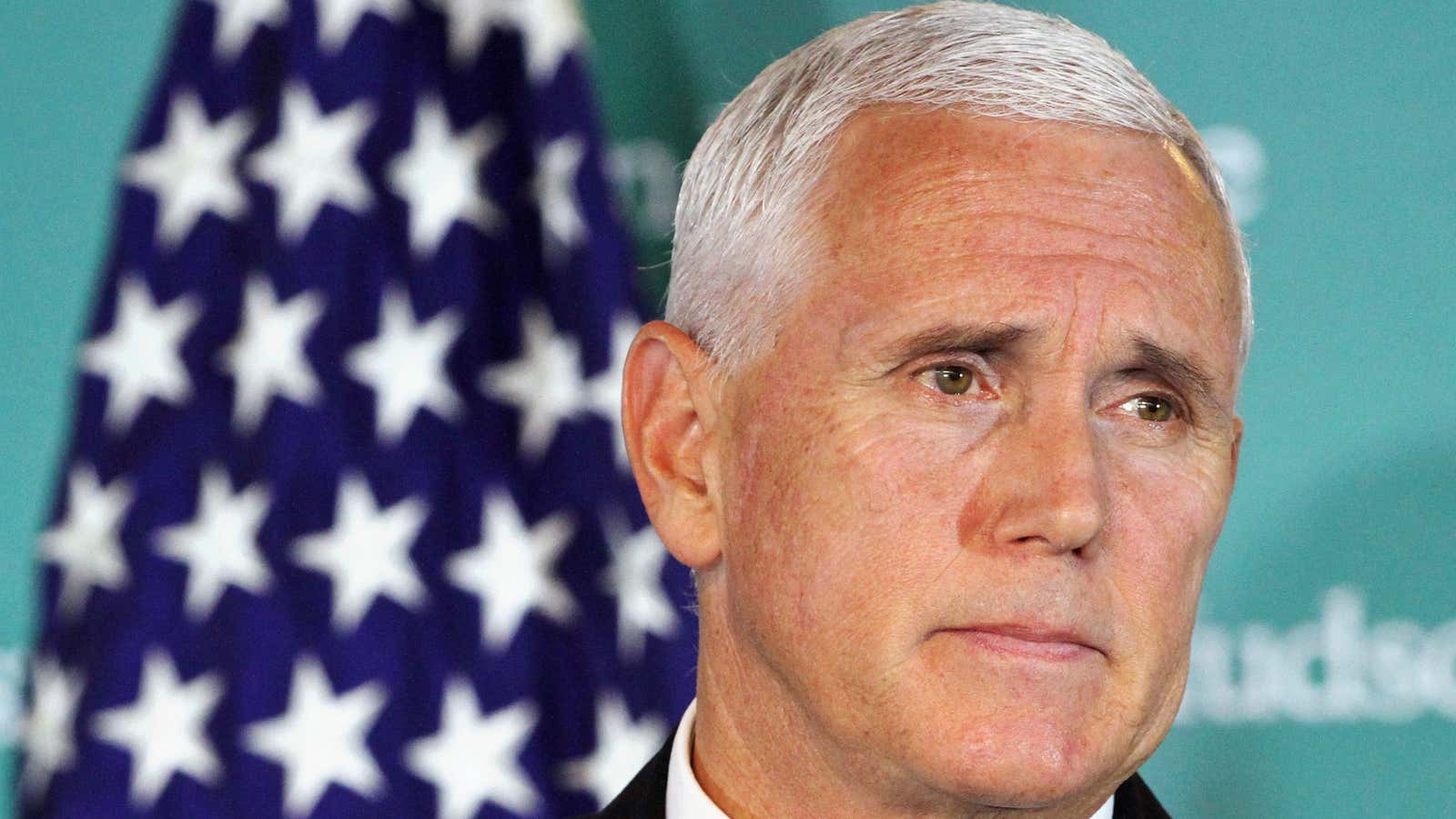Less than a year ago, Donald Trump was banqueting with Chinese leader Xi Jinping in Beijing and toasting “to a friendship that will only grow stronger and stronger in the many years to come.” Now his vice president has pretty much declared China to be be America’s Public Enemy No. 1, bolstering an “us vs. them” narrative that is also spreading in China.
In a speech at a conservative think tank in Washington on Thursday (Oct. 4), Mike Pence raised not just the US’s long-standing gripe against China—the trade deficit—but a host of other criticisms. He said China was interfering in US politics and also using a “whole-of-government” approach to mastermind “the wholesale theft of American technology.”
“Using that stolen technology, the Chinese Communist Party is turning plowshares into swords on a massive scale,” he said. The same day as the speech, a Bloomberg report citing intelligence sources said that Chinese military operatives had put a secret “backdoor” chip on motherboards sold to a slew of top US tech companies, and used by US security agencies.
China’s military rise, meanwhile, was aimed at preventing the US from coming to the aid of its allies in the Pacific, said Pence.
Pence also portrayed the China-US relationship as one in which the US has continually lent a helping hand to China for moral reasons—only to be disappointed.
“Previous administrations made this choice in the hope that freedom in China would expand in all of its forms—not just economically, but politically, with a newfound respect for classical liberal principles, private property, personal liberty, religious freedom — the entire family of human rights. But that hope has gone unfulfilled,” he said.
Pence’s words will lend support to a narrative already taking hold in Chinese state-run media and among armchair analysts, with many suggesting the successive rounds of Trump’s tariffs are really an effort to contain China’s rise, rather than to address legitimate trade concerns.
China’s foreign ministry strongly criticized Pence’s remarks on Friday, calling them “malicious slander” and created out of “thin air.” In response to Pence’s repetition of the Trump claim that the US has “rebuilt China” over the past quarter-century, a Chinese foreign ministry spokeswoman said:
China’s development is mainly owed to Chinese people’s hard work and its mutually beneficial cooperation with countries around the world instead of others’ alms and giving. No one can stop the Chinese people from steadfastly marching ahead along the path of Socialism with Chinese Characteristics and making greater achievements. The efforts made by anyone to distort the facts are doomed to be in vain.
On China’s Weibo social media platform, a trade war was starting to look like comparatively small potatoes.
“China and the US are no longer in a trade war,” said one commenter (link in Chinese). “Sino-US relations have deteriorated sharply, faster than I expected.” Another commenter said “the policy of confrontation and blocking has begun.”
One bemused person asked, if China’s political interference efforts are indeed so formidable, “Why are we in a trade war with the US?”
Some critical voices used the debate to dig at Beijing’s own political system, wondering how China would have the know-how to interfere in elections elsewhere when it has so little experience of them at home. Others, citing an insert by state-run China Daily in Iowa’s Des Moines Register, agreed with Pence’s charge of interference.
Elsewhere in his speech, Pence raised some issues that have long concerned China watchers in the US and elsewhere. These include China’s treatment of minority religious groups and the detention of vast numbers of Uyghur Muslims in the far western Xinjiang region, as well as Beijing’s attempts to influence people beyond its borders. Critics have pointed to Beijing’s monitoring of Chinese students studying abroad; efforts to control how foreign companies allude to Taiwan; and the increasing activity of state-run news organizations overseas. But raising these issues in this forum, combined with a host of other accusations in a fiercely political speech, may not be exactly the advocacy many were hoping for.
